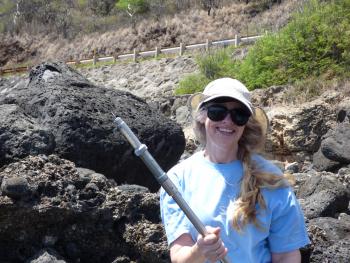Thea Johanos

Voices from the Science Centers
Voices from the Science Centers is an oral history initiative dedicated to documenting the institutional knowledge of fisheries scientists and administrators in the labs of NOAA’s Fisheries Science Centers.
Thea Johanos has been a research wildlife biologist with the Hawaiian Monk Seal Research Program at the Pacific Islands Fisheries Science Center (and its precursor, the Honolulu Lab) since 1982. She grew up in both Texas and Pennsylvania, and did her undergraduate and graduate work at Penn State University. After graduate school, she applied for work in Hawaii, as her family had just moved there. Her first job in Hawaii was with the US Forest Service working with Hawaiian honeycreepers and other forest birds. When the head of the newly established Hawaiian Monk Seal Research program was looking for field crew members, a contact in the bird community recommended Thea. The timing was right, since the bird program was being cut, so she switched to the monk seal program and has been with it ever since.
Interview contains discussions of: student research work in Wallops Island, Virginia, and Ossabaw Island, Georgia, animal behavior monk seal population assessment, field work, Northwestern Hawaiian islands, Critter cam.
Thea Johanos provides a rich description of her work with the endangered Hawaiian monk seal. She discusses her field work which she began in 1982. In addition, she describes how technology has changed in the field.
Please Note: The oral histories in this collection are protected by copyright and have been created for educational, research and personal use as described by the Fair Use Doctrine in the U.S. Copyright law. Please reach out Voices@noaa.gov to let us know how these interviews are being used in your research, project, exhibit, etc. The Voices staff can help provide other useful resources related to your inquiry.
The NOAA mission is to understand and predict changes in climate, weather, oceans, and coasts, to share that knowledge and information with others, and to conserve and manage coastal and marine ecosystems and resources. The Voices Oral History Archives offers public access to a wide range of accounts, including historical materials that are products of their particular times, and may contain offensive language or negative stereotypes.
Voices Oral History Archives does not verify the accuracy of materials submitted to us. The opinions expressed in the interviews are those of the interviewee only. The interviews here have been made available to the public only after the interviewer has confirmed that they have obtained consent.
